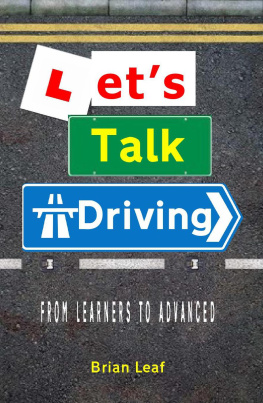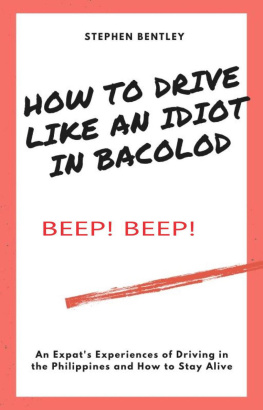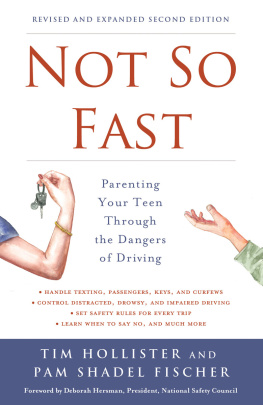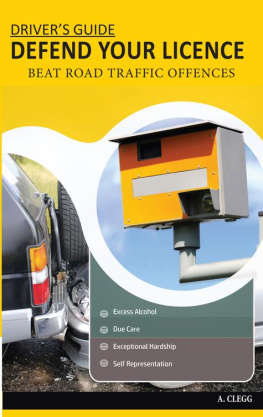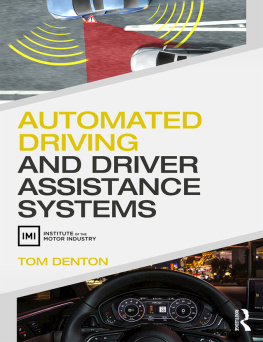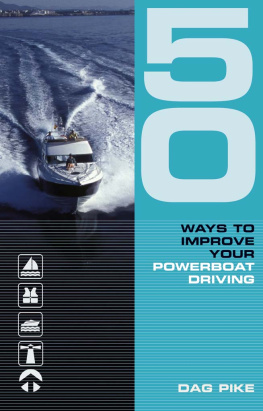Hows My Driving?
Why every other driver doesnt seem to have a clue!
Copyright 2019 by Steve Dziadik
ISBN: 978-1-950073-33-7
All rights reserved. No part of this publication may be reproduced, distributed, or transmitted in any form or by any means, including photocopying, recording, or other electronic or mechanical methods, without the prior written permission of the publisher or author, except in the case of brief quotations embodied in critical reviews and certain other noncommercial uses permitted by copyright law.
Although every precaution has been taken to verify the accuracy of the information contained herein, the author and publisher assume no responsibility for any errors or omissions. No liability is assumed for damages that may result from the use of information contained within.
Printed in the United States of America
GoToPublish LLC
1-888-337-1724
www.gotopublish.com
info@gotopublish.com
.
Contents
Dedication
This book is dedicated to my wife, Mary Ann, who has patiently, personally, and repeatedly experienced most of my professional evaluations of all the other drivers on the road.

This book also stands as a living memorial to our daughter who would have been our second child, one we never had the privilege and honor to meet in this lifetime.
Steves Theorem #1
I believe that virtually no one gets up in the morning, brushes their teeth, showers and gets dressed with the idea in their mind that they are going to be the worst driver of all on the roads today. The exception, of course, would be an individual bent on self-destruction, but you wouldnt know that for sure unless you interviewed them before they reached their ultimate de stination.
Steves Theorem #2
I believe the first person that the operator of a vehicle must be concerned with being a safe driver for is themselves, with the possible exception noted above in Steves Theorem #1. By doing so, everyone else on the road with you will automatically be safer.
Steves Theorem #3
I believe that getting from point A to point B does not necessarily make me or any other person a safe driver. It simply means that the goal of getting to point B from point A has been accomplished. It is also important, if not obvious; to know that this theorem stays true no matter how many times you successfully repeat it.
Steves Theorem #4
I believe that what seems obvious to me does not necessarily mean that it is obvious to someone else. In fact, that difference could seem to someone else as if the exact opposit e is true.
Steves Theorem #5
I believe that my own personal experiences in a vehicle DO NOT increase anyones experience level except my own. This was very difficult for me to learn and internalize. Having finally come to that realization then, I believe that my experience level continues to increase each time I get into or on a vehicle.
Steves Theorem #6
I believe that crash-free driving helps to set you up to more easily have a crash. Even near misses can build your confidence because you tend, with each non-event, to think you were totally responsible for the non-crash and the event is soon forgotten.
Steves Theorem #7
I believe that driving slowly does not automatically make anyone a safe driver. I further believe that, in fact, people that operate their vehicles significantly slower than others around them are often responsible, or at least share some of the culpability, in any resultin g crashes.
Steves Theorem #8
I believe that stopping for an orange traffic light or not being the last one to go through an intersection, because you nosed in where you shouldnt have been, will allow you to be late for your next crash by just the right amount of time. The result will be no crash!
Steves Theorem #9
I believe that discourteous behavior to other drivers on the roadway is NOT the result of an absence or lack of courtesy! I believe it is an overt action that a person takes based on a variety of reasons, not the least of which is to believe that your actions on the road MUST come before the actions of any other driver. My contention is that this is solely based on inward, self-centered and fundamentally flawed personal thought processes because no one is an island unto t hemselves!
Steves Theorem #10
I believe that when you observe someone do something clearly wrong on the roadways and do not try to share that with the violator that you are JUST AS WRONG as the person that did it. I fully realize that its not practical to accomplish this feedback all the time, but when you do, that feedback will potentially be enjoyed by someones life later be ing saved.
Forward
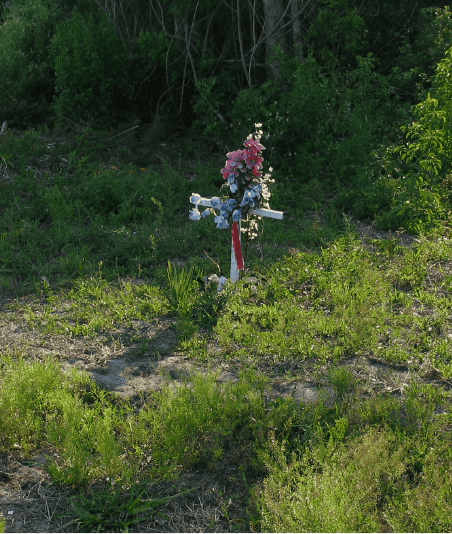
You cannot travel any distance on an interstate highway without seeing a marker like the one in the attached picture adorning the side of the roadway. It marks the spot where a loved ones life was needlessly and tragically ended. Youd think that only one of these markers would ever be necessary to promote other drivers on the roadway from driving with anything except the greatest caution, but that doesnt seem to be the case.
This book is not intended, in any way, to be humorous since the action of driving an automobile can be life altering and, very often, even deadly. I, however, will try my very best to relate the message that Id like to see you get, from reading what follows, in a way that is comfortable, interesting, thought provoking, challenging and hopefully, even enlightening for you. Perhaps you might be able to relate to some of my familys personal experiences that I will describe to help make various points. None of the experiences that I and/or my family have had were anything other than very serious and life altering at the time we went through each one of them. However, these experiences may cause you to think about something similar that happened in own your life or to your family. The way that you did or didnt satisfactorily handle that situation will also probably flash in front of your eyes.
Take just a moment, as you reflect on those events, to reevaluate your own personal experiences, some of which would probably horrify me. Im sure it would be worth the time spent to consider how you may have handled what happened to get a more desirable, and perhaps less painful outcome. I feel confident, however, that being exposed to what is in these pages, you will undoubtedly think about how you reacted when the circumstances described here were like what you have done in the past. Ideally what has happened to you, your heightened memories of those events, plus my familys related experiences, will have a positive effect on what you do when you are on the road in the future, especially if a similar scenario unfolds b efore you.
Introduction
George Carlin, the comedian, may he rest in peace, once said that his job was not to be funny, but rather to remind us of all the funny stuff we already know about but had just temporarily forgotten. Similarly, the most basic goal of these pages is to remind you of what you already know about driving safely but may have just temporarily forgotten or havent used for a long time. Louis Pasteur is noted for saying that Chance favors the prepared mind. This is very meaningful in job applications but, you should see as you read, it can also have a profound impact on your life as you commute back and forth to work, youre going to the market or even if youre just out for a lazy drive in the country one beautiful Sunday afternoon.


